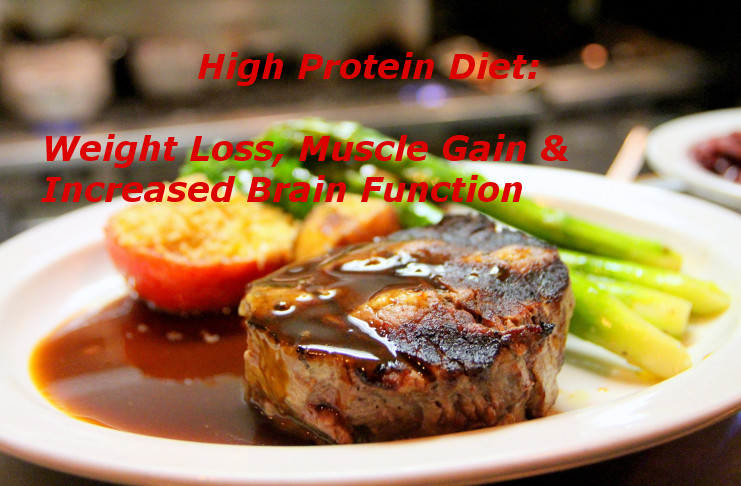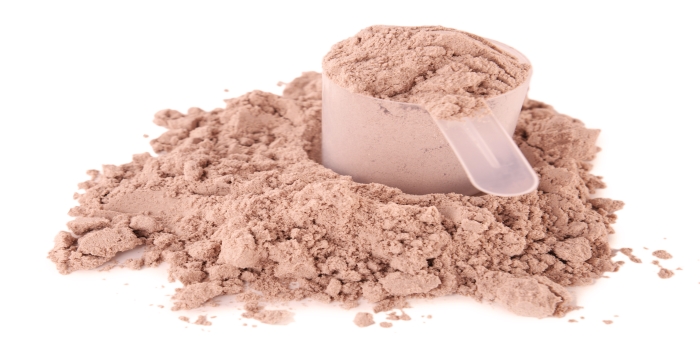Protein contains the building blocks of almost every cell in the human body. Without it, we’d be nothing more than a bunch of dry, brittle bones. A high protein diet offers lots of benefits including quick fat loss and muscle gain, increased strength, and improved brain function.
However, while we need enough protein to sustain life, there’s been much disagreement in recent years about whether “more than enough” is “too much” protein in terms of long term health.
Continue reading if you’re considering a high protein diet, to learn how it can help you get the body and brain you desire.
Daily Caloric Needs
The old rule of calories in, calories out is still a very effective way to accomplish your body modification needs. In order to lose or gain weight on any diet, you’ll need to have an accurate idea of how many calories you need to maintain your current body weight.
Losing weight requires going below your minimum calorie threshold. Gaining weight, muscle or fat, requires going above your maintenance needs. Consulting a dietitian or personal trainer will likely give you a better idea of your daily calorie needs, but you can get a pretty accurate estimate using a free online calorie calculator like this one.
To determine the nutrition information of a given food, I always trust the Self Nutrition Data website, which is also free to use and comprehensive.
A high protein diet is generally defined as one that constitutes consuming more than a gram per pound of body weight for muscle gain, and approximately 30 percent or more of total calories when restricting calories for weight loss.
Main Benefits of High Protein Diet
1. Fat Loss
Anyone who’s ever heard of the egg-only or meat-only diets will be familiar with the weight loss benefits a high protein, low calorie diet can offer. High protein foods like eggs, meat, nuts, cottage cheese, and fish like salmon, tuna and shellfish are very filling even in small amounts. In fact, it would be exhausting and likely very nauseating to exceed your daily caloric requirements with these protein dense foods.
When calories are reduced, weight loss in the form of unwanted body fat is inevitable. The reason that eggs and meat, particularly red meat are most favorable when it comes to fat loss is because neither are terribly high in calories. Yet all have adequate natural fats to sustain a healthy metabolism while under a caloric deficit.
Fast facts:
• Meat averages around 700 calories per 100 grams, providing a whopping 117 grams of protein per serving.
• Eating 20 eggs throughout the day creates a caloric deficit for both sexes at just 1600 calories and 120 grams of protein.
• If you’re eating below your daily caloric maintenance levels, any protein that isn’t used for tissue maintenance will be used as glycogen for energy or excreted, not stored as body fat.
The best part about this kind of weight loss diet is that existing muscle is spared because of the large amounts of amino acids you’re taking in. If you don’t like the idea of cutting out your veggies; low calorie salad greens like steamed spinach, kale, lettuce, chard, celery and others can be added to a high protein weight loss diet, provided nothing but no calorie seasoning is added to them.
2. Muscle and Strength Gains
Anyone who lifts weights for bodybuilding, powerlifting, Crossfitting, or who engages in other activities that require muscle size and strength can benefit from more protein in their diet. Protein contains amino acids, and those aminos are the building blocks of all oxygen-breathing life on earth.
It’s important to note that the super-high protein diet mentioned already for weight loss wouldn’t be conducive to building muscle, as the body is designed to only add muscle size when we take in more calories than we need for maintaining body weight. That doesn’t mean you can’t still add strength in a caloric deficit, but without additional calories, the law of diminishing returns will eventually take over.
Fast facts:
• Protein is the driving force of nearly every cell in the human body.
• Eating more protein than you need won’t make you gain excess bodyfat, or raise negative blood markers when carbohydrates are restricted (read hundreds of interviews found on this site).
• High protein diets used by strength athletes often get a bad rap, but very little evidence suggests they’re harmful for healthy people.
Strength and muscle size are, in fact, synonymous with each other. This can be confusing, since there are many “small” athletes that can lift insane amounts of weight. However, current world deadlift record holder and 2017 World’s Strongest Man, Eddie Hall, weighs over 400 pounds of solid muscle because a 300 pound man couldn’t hoist the 1,102 he can!
3. Better Brain Function
This benefit generally comes from a high protein diet that’s also low in refined sugars and other digestible carbohydrates. Many people have reported increased cognitive function, including reduced brain fog, while consuming a diet where approximately 30 percent or more of calories come in the form of protein.
An all meat, all egg, or ketogenic diet will check all the boxes needed to start realizing improved brain function. The main dietary component that needs to be eliminated is carbohydrates as excess blood sugar causes an insulin dump, which results in blood sugar swings. Stable blood sugar levels lead to better concentration and memory recall.
Fast facts:
• Blood sugar fluctuations, and the resulting insulin dump that follows, disrupts all organs in the body, including the brain.
• Constant rising and falling blood sugar levels make your brain and body tired as the endocrine system has to work harder to maintain balance.
• High protein, high fat, low carb diets don’t cause blood sugar fluctuations and promote a balanced endocrine system.
When excess sugar is consumed, your body releases a ton of insulin to open up the body’s glucose storage pathways in the liver and fat cells. Blood sugar levels rise abruptly after a meal, then a few hours later abruptly fall due to all the insulin in the blood. When this happens, the brain and body become tired and compromised, and hunger levels go through the roof as the body craves more sugar to compensate for the energy dip that follows a high carb meal.
Not only does this cause us to get fat, high insulin levels over time lead to metabolic syndrome including type II diabetes, cholesterol imbalance, and excess triglycerides in the bloodstream. These excesses lead to “beta amyloid” plaque formation in the brain, which slowly destroys memory function and can lead to age-related diseases of the brain.
Potential Side Effects of High Protein Diet
1. Adjustment Period
This article has obviously been leaning toward more protein and healthy fats, and much fewer carbohydrates than the typical diet consumed by many around the world. If you choose to eliminate heavy carbs from your diet all of a sudden, a definite side effect is a condition known as the “keto flu.” A keto flu encompasses a couple issues the body has to deal with:
A. The body has to learn to use energy from fat stores and the dietary fat consumed in the diet. This can take a few weeks or a few months before the body adjusts. During this time, blood sugar will be low and sugar cravings can be difficult to ignore.
B. High carbohydrate diets include a lot of toxins such as pesticides, herbicides, and preservatives found in fruits, veggies, and processed foods. As they’re moved out via the digestive tract, one can expect to feel headaches, nausea, and digestive disturbances such as diarrhea and excess flatulence.
2. High Protein Not For Everyone
Despite the great benefits a high protein diet offers, people with liver or kidney issues can worsen their health on a high protein diet. Each organ plays a role in absorbing and assimilating protein. When the body gets way more of it than needed for basic maintenance in the presence of liver or kidney disease, the entire body slows down and becomes more stressed than it was previously.
Healthy High Protein Food Choices
• Red meat (most complete amino acid source)
• Eggs
• Salmon
• Chicken
• Turkey
• Pork
• Oysters
• Cottage cheese
• Unsweetened Greek yogurt
• Unsweetened whey protein
• Almonds
• Peanuts
• Crickets
• Grasshoppers
Note: If the idea of eating bugs bothers you, crickets, grasshoppers and many other bugs are a complete protein source, have a neutral taste, and can be cooked and eaten whole. Compare that to any other animal, including fish and the waste created once they’re processed. Eating bugs is sustainable and considered by many as one of a few viable options available to sustain humans as the population continues to tip the scales.
Healthy Low Sugar Vegetables and Fruits
• Sprouts
• Lettuce
• Spinach
• Swiss chard
• Collard greens
• Kale
• Celery
• Bok Choy
• Radishes
• Seaweed (and other sea veggies)
• Cabbage
• Mushrooms
• Avocado
• Cucumbers
• Asparagus
• Herbs (all kinds — eat as much as you like)
High Protein Diet Makes Traditional Food Tables Obsolete
I can’t legally recommend you drop your current diet and adopt the higher protein, lower carb variation described in this article. However, protein has been demonized the last half-century or more. Despite the fact that people all over the planet survived just fine largely on meat-based protein where grains weren’t available and fruits and veggies were in limited supply.
Anthropologists know for a fact that the human body became stronger and the brain bigger after we learned to hunt animals. This gave our bodies the increased protein it needed to develop beyond our cavemen roots.
A high protein diet may not be what your doctor would suggest for you, but there are countless people, including scientists, on the planet that suggest that more protein and healthy fat is in, and carbs of all kinds should be largely left out of a healthy modern diet.
Note: The information on this page is not a recommendation from a healthcare professional. Consult your doctor before considering a high protein diet. This goes double for people with any type of health problems.




